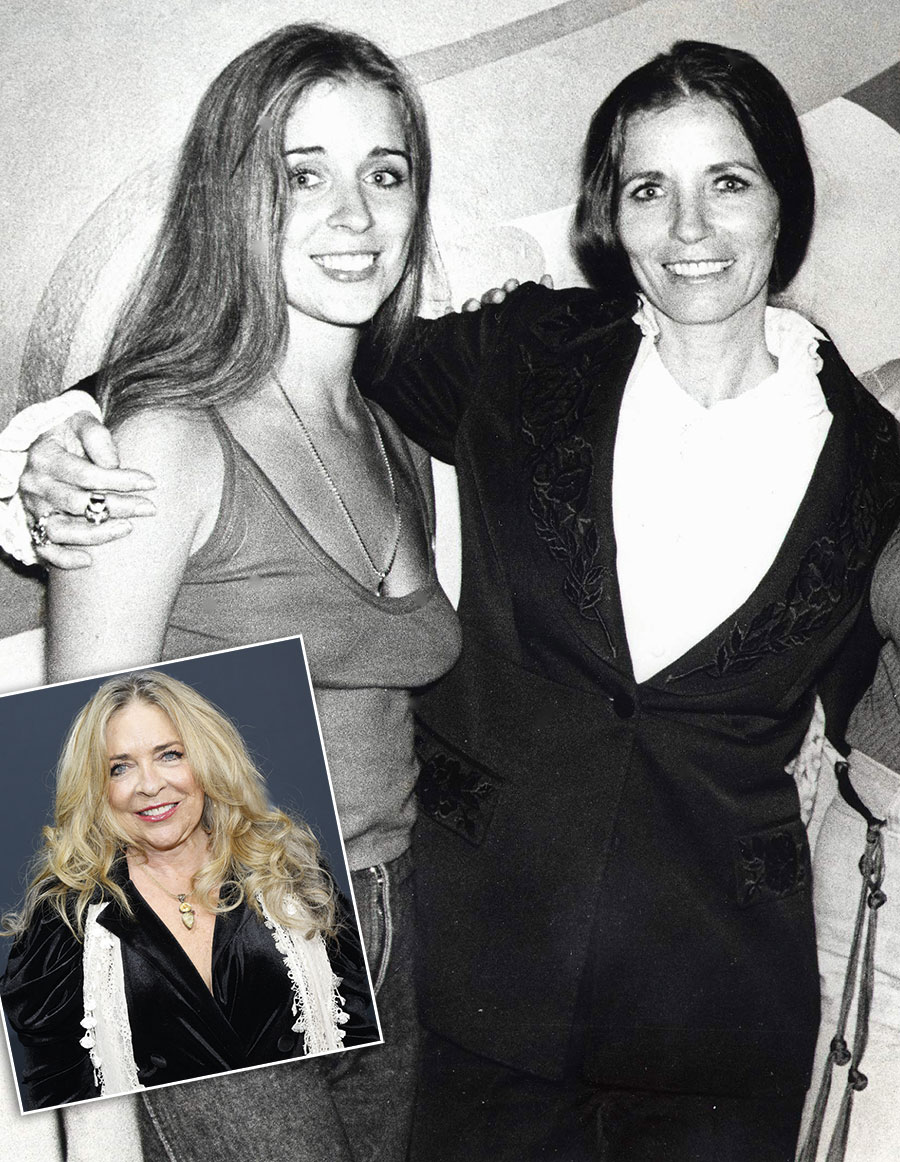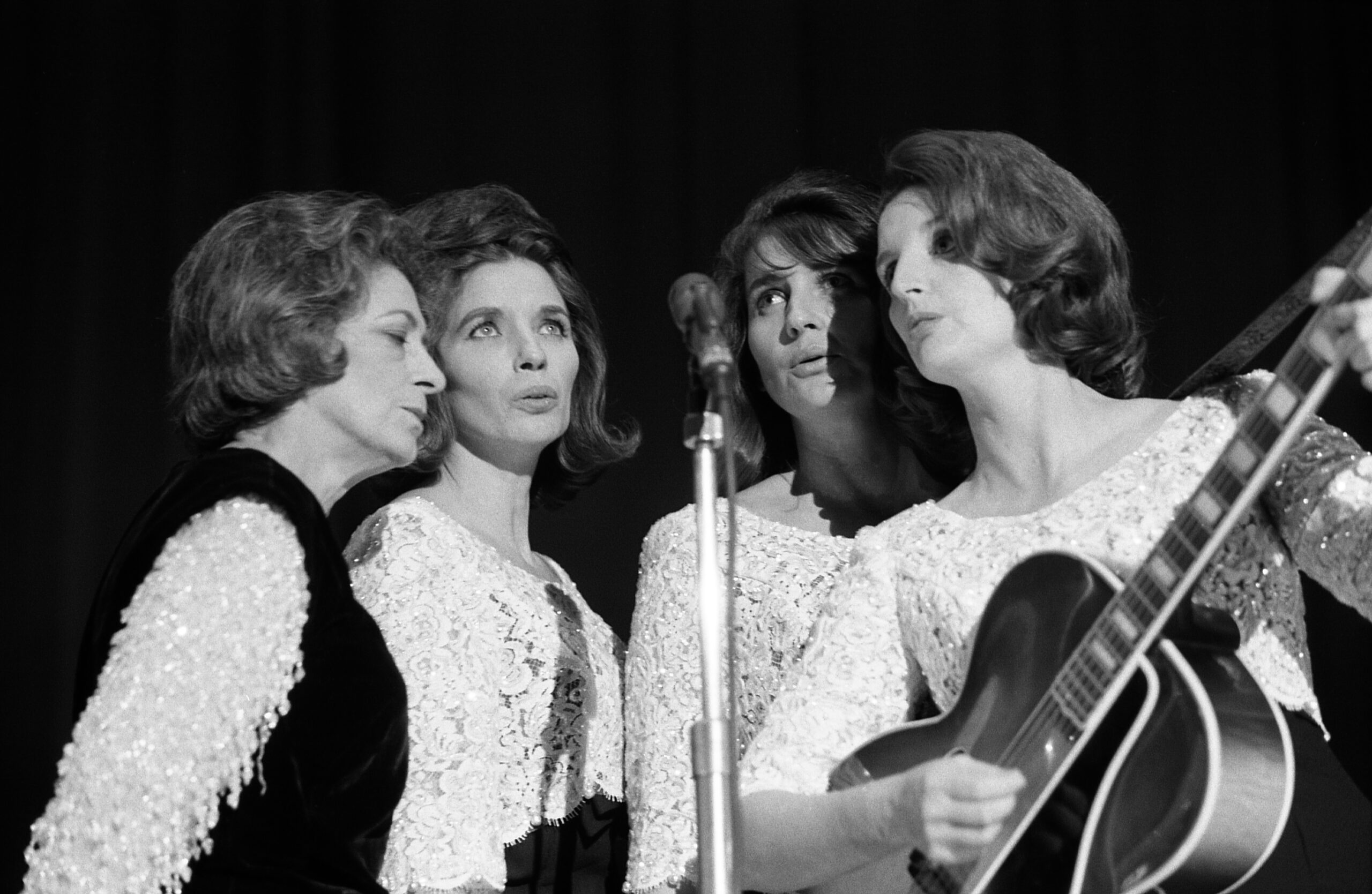‘June’: New Documentary Spotlights the Incredible Life and Legacy of June Carter Cash

June Carter Cash – then just June Carter – circa 1965. The new documentary, 'June,' puts her own legendary career and legacy firmly at the fore. Photo: GAB Archive/Redferns/Getty Images
The documentary June, now streaming on Paramount+, is the story of June Carter Cash – singer, songwriter, musician, actress, dancer and comedian from the famous Carter Family – who dimmed her own spotlight to support her third husband, the “Man in Black,” Johnny Cash, with whom she toured. In addition, she is actually the co-writer of his smash hit “Ring of Fire,” with Merle Kilgore.
The film, directed by Emmy Award-winner Kristen Vaurio (Going Clear: Scientology & The Prison of Belief) and executive produced by June and Johnny’s only child, John Carter Cash, removes June from her husband’s shadow to put her own career and legacy firmly at the fore. It even goes back to her famous mom Maybelle, a pioneer in country/folk music with The Carter Family, which released its first record in 1927. The distinctive “Carter scratch” is named after her style of guitar playing. June joined the Carter Family performers at age 10.
Johnny famously proposed to June in London, Ontario, in front of 7,000 people, back on Feb. 22, 1968. “It’s yes or no. The show must go on and I said, ‘Yes,’” June says in the documentary, which is filled with archival photos as well as audio and video clips of the multi-talented lady who died on May 15, 2003, at 73. Johnny passed away just four months later, on Sept. 12, at age 71.
Interspersed amongst the linear telling of her life are interviews with admirers and fellow luminaries like Dolly Parton, Willie Nelson, Kacey Musgraves and Reese Witherspoon, who won an Oscar for her portrayal of June in the 2005 film Walk The Line, opposite Joaquin Phoenix (as Johnny).
Carlene Carter, 68, June’s daughter with her first husband Carl Smith, also appears in the film. Carter, who has performed as part of the Carter Family and a solo artist, kicks off a U.K. tour on Feb. 2.

She recently spoke with Zoomer about the film and her mother’s legacy.
KAREN BLISS: June is a wonderful film. You see your mom’s enormous personality, her humour. She seemed like a really lovely, vibrant, unique personality.
CARLENE CARTER: Eccentric. Let’s get real here, eccentric.
KB: We all have boxes of family photos and old footage of growing up. What does it mean to you that so much of that was all put together into this amazing documentary to tell your mom’s story?
CC: There’s always that temptation to hold on to stuff for something else, later. This is all about June. This is all about Ms. June. We did our best to get everything that we could that they needed to be able to tell the story to the fullest of their capability. Kristen Vaurio did such a great job as a director. It’s all fallen into place in a really cosmic kind of way. Every time I’ve seen the film, I’m so proud of it. You can’t ask for more than that. And I know my mom would really like it.
KB: Near the beginning of the film, we hear your mom saying that she didn’t know that her mom was different. Did you know when you were a kid that your mom was different?
CC: I didn’t really that much. I never fantasized about it because my mom was fun and my mom went to work and would go away or I would go with her, and then she would be home for like a week or two weeks … Mind you, I grew up with a lot of other country entertainers’ kids. We all lived in this certain neighbourhood, right in Nashville, called Madison … Hank Snow lived there, Cowboy Copas, Patsy Cline, Brenda Lee, mama’s peers and friends. That’s what I knew that seemed normal to me.
My mom would come to school and entertain my class from the time I was in first grade through sixth grade. After I turned 12, I had to call a halt to it because it was just too much [Laughs]. For one thing, they’d gotten super-duper famous overnight. But, this was in Madison; my mom would come in her stage outfit with pantaloons on and stick those high heels up on a stool and get her banjo out and start playing and telling these funny stories to the little kids. I was so bursting with pride; at the same time, absolutely horrified.

KB: Is there any footage of your mom in the film that you had never seen before?
CC: There was some film footage of mom acting that I had never seen before. When she’s leaving acting and goes back to Nashville full time. I won’t say she ever left acting in her heart of hearts, but when she stopped being in New York as much, she looked so vulnerable. And I know that look; I’d seen that sadness in her eyes before. But to see her actually acting, and have it be so authentic and real. That was her gift; that she was authentic and real … Mom was serious about it. She really wanted to be on Broadway.
KB: Your grandmother was a trailblazer for women. As was your mom. What did you take from that?
CC: Well, I’m a trailblazer too. ‘Don’t be scared. Be yourself.’ It was always that way for all of us. Also too, the thing of genre, identifying yourself as one thing, is not necessarily – unless that’s the only dang thing that you care about or want to do – if there’s any other aspects to yourself, never define yourself by words, in that sense. Somebody said, ‘Oh, you’re country rock.’ I said, ‘No, I am rock and country.’ That was my thing. I also had a rock attitude, which came from my family. Grandma was the dang rockstar. My grandmother, she influenced Jerry Garcia. Who can say that? One little woman from Maces Spring, Virginia, could influence Jerry Garcia and have all the Deadheads know who she is because she was his influence. It’s kind of neat. So, yeah, they were trailblazers and they were fearless.

KB: In 1998, all the record labels passed on your mom because of her age. Today, Dolly Parton and Emmylou Harris are still making records. Madonna is on tour. Historically, ageism in the music industry is more against women in their 60s and 70s, than men. Do you experience that?
CC: Oh, absolutely. I had a reputation in Nashville at some points of being one of the hardest working women in country music because I would just tour. You give me a tour bus, it’s like I’m wearing it. As long as I can take a nap and get on stage and get fed and play music, I’m a happy camper. But the ageism thing is just not right. It happened to me not that long ago, where I was told no one really cares about someone in their 60s that’s used to have some hits. I was just like, ‘You know, I ain’t buying that stuff at all because I have stories and songs and I’m still here.’ As long as we’re above ground and I got a mouth [Laughs], I’m gonna keep talking and entertaining people because I just like making people feel good and if they can come and see me play, they usually leave happier than they were when they got there. And that’s my job. I like to be a professional cheerer up.
KB: Johnny was your mom’s third husband. Statistically, the divorce rate is very high for second and third marriages but they proved everyone wrong, lasting 35 years. What do you say to people who have the opportunity to go into a second or third marriage?
CC: Honey, I believe in marriage. I also believe in divorce. I’ve been married four times myself. And a lot of that had to do with the fact that I thought very much like my mother did, that if I had sex with someone, I had to get married or I would go to hell. That’s just the damn truth, right there. But there was a sustainability to John and June that was undeniable. They did not give up on each other. There’s the whole fairytale thing of June. She inspired him to do better. No one person can save someone. They can try all day long, but they’ll probably go down with the boat themselves. And having been there, in my own life, in relationships that I’ve been in, if somebody decides they’re going, they’re going. John didn’t wanna leave June and he didn’t wanna lose June, and if that’s what it took, then that’s what it would be.

KB: You mom had all these nuggets of wisdom, like “press on.” When you’re going through troubles in your life, what is it that you hear her saying?
CC: “It’s gonna be okay. Your life is pre-ordained.” My mother told me this my whole life. Your life is preordained, and it’s already written what it’s gonna be. You can make free will choices. They may take you off on a path that may teach you something else that you need to learn. She was very wise. She always talked to me like I was an adult, even as a kid. She talked to me plainly and sweetly and not in baby talk. She was the softest place I ever knew to land. If I needed mom, I wanted my mama, and the same thing [with] my daughter … she wants her mama. And, grandma was my other mama too. I’m getting a little choked up here.
KB: I get it. And I want to send my condolences. I know it was 20 years ago but my dad died six years ago and it still seems like yesterday.
CC: It doesn’t change. It’s a beautiful feeling to miss them. When I say them, I mean all those that have gone ahead. It’s not a bitter feeling at all. I feel like they’re in a beautiful place, where there’s no problems.
RELATED: